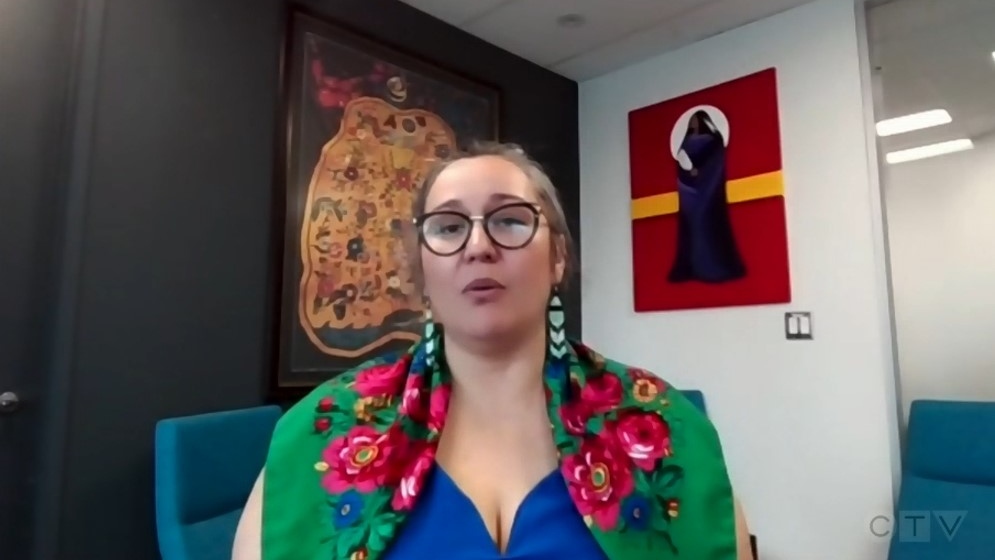Cree leader fears Quebec's new French-language law will complicate relief during natural disasters
With wildfires affecting every community in her nation, Grand Chief and Chairperson of the Cree Nation Mandy Gull-Masty said she hopes the Quebec government takes a look at how the changes to the French-Language Charter will affect communication and logistics with the 11 communities spanning around 400,000 square kilometres of the Eeyou Istchee (Cree territory).
"The French language is something that can contribute to additional communication issues," Gull-Masty told CTV News.
"We are an English-speaking nation for the majority -- we are Cree language speakers, our colonial language is English -- [and] there has to be accommodation. There has to be a review of certain components of that bill because English is going to be something that's very apparent in an emergency situation in our territory."
Though Indigenous people are exempt from Bill 96, those in the provincial emergency response teams, such as SOPFEU, are not and will need to communicate with the around 18,000 people in the vast territory.
The biggest operational challenge for a massive territory like the one the Cree occupy is evacuation, the grand chief said.
"Getting communities seven or eight hours away to the point of evacuation was extremely challenging ... It's an expensive territory," said Gull-Masty. "If you drive from one point right across, that's about 15 hours of travel, so it's really important that our communication is very, very highly developed."

The currently raging fires have affected every community on Cree territory and they are the worst the grand chief has seen. She said she fears it could get worse in the summer months.
"Sadly, it has just started," she said, adding that the federal and provincial governments need to harmonize services with her communities.
This year, Gull-Masty said the coordination has been efficient but fears how rules related to the French-language law will affect that coordination in the future.
"My question to the government is: how are you going to be rolling that out? How will you be monitoring and sensitizing government services to ensure that when an Indigenous person comes forward and requests those English services that they have been trained to do so and know which steps to take in offering that," she said.
"My concerns are in the future. If you don't have a francophone or an anglophone on your team, how are you going to overcome those barriers, especially in times like this, where you have to react very quickly?"
CTVNews.ca Top Stories

Canadian musician Jacob Hoggard found not guilty of sexual assault
Canadian musician Jacob Hoggard has been found not guilty of sexually assaulting a young woman in northeastern Ontario eight years ago. The former Hedley frontman had pleaded not guilty to sexual assault.
Police arrest Toronto woman in connection with three recent homicides
Police have arrested a Toronto woman in connection with three recent homicides and investigators say that they believe two of the victims may have been 'randomly targeted.'
Missing B.C. climber died from fall on Mount Baker, medical examiner says
The body of a British Columbia mountain climber has been located and recovered after the 39-year-old man was reported missing during a solo climb on Washington state's Mount Baker earlier this week.
Following child's death in Ontario, here's what you need to know about rabies and bats
An Ontario child died last month after coming into contact with a rabid bat in their bedroom, which was the first known human rabies case in Canada since 2019.
A French judge in a shocking rape case allows the public to see some of the video evidence
A French judge in the trial of dozens of men accused of raping an unconscious woman whose now former husband had repeatedly drugged her so that he and others could assault her decided on Friday to allow the public to see some of the video recordings of the alleged rapes.
Former Colorado county clerk Tina Peters sentenced to 9 years for voting data scheme
A judge ripped into a Colorado county clerk for her crimes and lies before sentencing her Thursday to nine years behind bars for a data-breach scheme spawned from the rampant false claims about voting machine fraud in the 2020 presidential race.
Anne Hathaway confirms 'Princess Diaries 3': 'Miracles happen'
You might be thinking, 'Shut up!' but it’s officially true: the 'Princess Diaries' franchise is finally growing.
Youth pleads guilty to manslaughter in death of P.E.I. teen Tyson MacDonald
A teen charged with the murder of another teen on Prince Edward Island last year has pleaded guilty to a lesser charge of manslaughter.
Sask. man pleads guilty in U.S. after unknowingly providing videos of men raping toddlers to FBI agent
A Saskatchewan man living in the United States has pleaded guilty to possessing child pornography after he unknowingly provided disturbing videos to an FBI agent he thought was a pedophile.
































